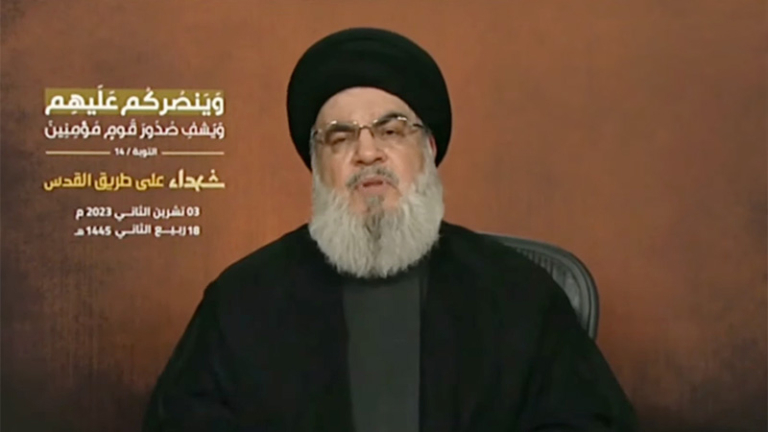
Where is Hezbollah and its General Secretary Hassan Nasrallah? This was a natural refrain over almost the last four weeks, voiced by many observers and partisans on both sides of the Israel-Hamas conflict that is entering a bloody fifth week on November 4th. The leader of arguably the most powerful pro-Iran militia was conspicuously absent from the airwaves which he had previously used to explain his party’s identity, ideology, alliances, and strategy, and to threaten foes inside Lebanon and outside of it, especially Israel.
But absent no more. On November 3, Nasrallah spoke to his followers and partisans and to his domestic, regional, and international audiences about what he sees in the current conflict in Gaza and what it means for his party, country, Iran, and its so-called “axis of resistance.” He also was keen to send messages to Israel and the international community, especially the United States. A number of conclusions can be summarized from his speech, but the overarching one is that Hezbollah is not interested in widening the scope of the Gaza war unless provoked by Israel, and is demanding a cessation of hostilities to spare the lives of innocent Palestinians in Gaza.
First, Nasrallah was clear to point out that the Gaza war was a decision taken by Hamas alone, and it was a purely Palestinian decision. Hamas, he said approvingly, planned its operation in secret and did not inform any of its allies of it. This sent a number of messages: that Palestinians are free to decide for themselves what they do and how they conduct their struggle against Israel; that Iran (or indeed Hezbollah and the others in the axis) did not ask Hamas to attack Israel; and that arriving at a ceasefire and ending the hostilities is in Hamas’s hands.
Second, Nasrallah said that Hezbollah has actually been a part of the war against Israel since it began, without actually declaring that it joined it. The party has both attacked Israeli targets and responded forcefully to Israeli provocations, in the process losing fighters and equipment and causing deaths and destruction among Israelis. Concomitantly, Nasrallah intimated that Israel controls the tempo of what happens in the future on the Lebanon-Israel border, but that his party is ready to escalate in response to Israeli leaders’ decisions, emphasizing that Hezbollah keeps its options open.
Third, Iran remains a friend and major supporter of the forces of resistance in the Middle East. But the Islamic Republic does not control what Palestinian, Lebanese, or other members of the axis do. They decide for themselves and according to their own circumstances and conditions what to do regarding their national issues and concerns.
Fourth, the United States is as guilty as Israel in the war on Gaza and its deployment of naval vessels does not scare Hezbollah. Thus, ending the war is an American decision since the United States is the major supporter of the Zionist state. In this, the General Secretary may be exaggerating the degree of American influence on Israel; Israeli Prime Minister Benjamin Netanyahu just rebuffed Secretary of State Antony Blinken’s request for so-called “humanitarian pauses” in the fight in Gaza so that food and supplies can be delivered to the besieged Palestinians there.
Indeed, the long weeks of waiting for Hezbollah’s official position on the Israeli war on Gaza have ended with a reaffirmation of the status quo ante preceding Hamas’s operation on October 7. To call Nasrallah’s speech a decisive moment for Hezbollah regarding the ongoing slaughter of Palestinians in the Gaza Strip would be a colossal mistake. But to also call it a whimper would ignore the General Secretary’s allusions to a reserved power that now constitutes a great deterrent to Israeli transgressions. For now, Nasrallah appears to have chosen to keep his options open but to send messages that he is not interested in an escalation with Israel, or the United States, pending developments on the ground.
The views expressed in this publication are the author’s own and do not necessarily reflect the position of Arab Center Washington DC, its staff, or its Board of Directors.

